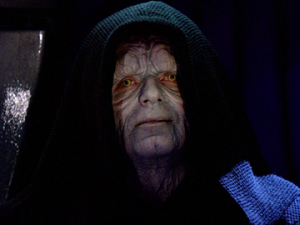 Recently, I sat down and watched, for the second time, back-to-back, the last two movies of the Star Wars prequel trilogy – Episode II: Attack of the Clones and Episode III: Revenge of the Sith. I had not seen either movie in several years, but wanted to review them after a recent Star Wars marathon on Spike TV during the Thanksgiving weekend when I saw most of all the three Star Wars movies in the original trilogy.
Recently, I sat down and watched, for the second time, back-to-back, the last two movies of the Star Wars prequel trilogy – Episode II: Attack of the Clones and Episode III: Revenge of the Sith. I had not seen either movie in several years, but wanted to review them after a recent Star Wars marathon on Spike TV during the Thanksgiving weekend when I saw most of all the three Star Wars movies in the original trilogy.
As I watched these two movies, I was amazed to see a lot of quintessential leadership – the presence or lack of presence – issues emerge. I decided to do an analysis of how Anakin Skywalker became Darth Vader, because in looking at the transformation, we can learn some important lessons about quintessential leadership – what it is and what it isn’t and how the presence or absence of the components of trust and trustworthiness, which I’ve discussed in detail in this blog, determine whether even the most competent, gifted, and capable people are also quintessential leaders.
 One of the first things I noticed this time is how much Anakin and Luke Skywalker were alike in temperament and thinking. Both men were extremely gifted, but both also overestimated their gifts and their abilities and it created a recklessness and pride in them that clouded their ability to think clearly, to be humble, and to exercise self-control.
One of the first things I noticed this time is how much Anakin and Luke Skywalker were alike in temperament and thinking. Both men were extremely gifted, but both also overestimated their gifts and their abilities and it created a recklessness and pride in them that clouded their ability to think clearly, to be humble, and to exercise self-control.
Both Anakin and Luke Skywalker were inconsistent in performance. At times, they both did the right thing, and at other times, they both did the wrong thing. Emotionally, they were both out of control, and they both lived their lives based on their feelings, which is why they both had an inconsistent level of performance. In short, they were unreliable and unpredictable, which are traits of unquintessential leaders.
Additionally, both Anakin and Luke Skywalker shared the trait of impatience. This came in part from pride and their overestimation of themselves, but it also came from a lack of contentment with where they were and what they were doing and the ability to see each step as part of a big-picture process. They both wanted, for example, to be Jedi knights – and both pretended to be before they were – before they had met all the qualifications through training and experience to actually be a Jedi knight.
This is a common character flaw that we find in unquintessential leaders. They want to positions, the titles, but they are either unwilling or unable to patiently do the work and take the time to be qualified to have those positions and titles. When they find a way – as Anakin did – to take a shortcut to where they believe they should be and want to be, the results are always disastrous.
Luke, in spite of sharing many of the unquintessential character traits of his father, turned out to, when push came to shove, avoid the same path his father had chosen. But it occurred to me that even though he did the right thing in the end, he still had the character flaw that he shared with Anakin of questioning the fairness of things as it related to him and he never completely learned to control his emotions, so Luke, as a force for good, long-term, remains questionable in my mind. Doing one right thing one time doesn’t make a person’s character. Right character is developed through a lifetime of making the right choices every time, all the time.
Granted, none of us does this perfectly, but a quintessential leader has this at the front of his or her intent and purpose at all times. That’s the quality of integrity.
So let’s look briefly at the unquintessential leader traits that Anakin Skywalker had that led him to choose to become Darth Vader. Notice that I purposefully used the word choose, because that is a crucial element in this discussion: the totality of all the choices in life that each of us makes is an integral component of whether we are quintessential leaders or unquintessential leaders at our core. Granted, there are gifts, abilities, talents that contribute to this equation, but even there, we have the choice to develop them or ignore them, use them or not use them, and to decide how we’re going to use them, so choice is always involved at the fundamental level.
In Episode II: Attack of the Clones, we see Anakin Skywalker as a young adult and in an apprenticeship with Obi-Wan Kenobi to become a Jedi knight. One of the things that stands out about Anakin’s character, even here, is how forcefully he is led by his emotions. He’s a no-holds-barred kind of person when it comes to how he feels. His pursuit of love is untamed and relentless. His fears rule his days and nights. His anger is fierce and hot. His resentments about the things he believes aren’t fair seethe steadily just under the surface, occasionally spewing out in volcanic outbursts.
 Interestingly, both Yoda and Obi-Wan Kenobi – as they would years later with his son – are constantly warning Anakin about self-control in all areas of his life (choices), but especially with regard to his emotions. Anakin doesn’t realize that being led by his emotions is the destabilizing force in his life.
Interestingly, both Yoda and Obi-Wan Kenobi – as they would years later with his son – are constantly warning Anakin about self-control in all areas of his life (choices), but especially with regard to his emotions. Anakin doesn’t realize that being led by his emotions is the destabilizing force in his life.
Emotional thinking crowds out objective thinking and the ability to observe things are they are instead of things from – as Obi-Wan ironically tells Luke to explain not revealing Darth Vader as Luke’s father – from a “certain point of view.” Emotional thinking leads to inconsistency, which is an unquintessential leader trait.
The roots of Anakin’s discontent, which is fueled by his rampant and conflicting, at times, emotions are evident in this episode.
He doesn’t see, for example, Lord Palpatine clearly, and believes he is one of the good guys, while Lord Palpatine is slowly and deliberately using Anakin’s emotional thinking and lack of objectivity to surreptitously manipulate Anakin.
Anakin believes that things the Jedi are or aren’t doing for him, with him, and to him are not fair and are holding him back. This belief is fully cemented in Episode III: Revenge of the Sith, and it becomes the underpinning of all the choices he makes from there on out.
As a result of Anakin’s lack of self-control, not only with his emotions, but in the rest of his life, where we see the same vacillation between extremes that his emotions have start appearing, we see three other unquintessential traits appear: a lack of integrity, a lack of honesty, and a lack of authenticity.
Anakin becomes dishonest with everyone, including himself, in these two episodes. Anakin isn’t even truthful with his wife, even though his fear – uncontrolled emotion – of her dying in childbirth leads him to choose to become Darth Vadar, because Lord Palpatine offers Anakin the power to prevent her death. This dishonesty also points to Anakin’s self-absorption, self-centeredness, and selfishness.
No longer is he focused on the big picture of why he is there and what the mission of the Jedi is. It no longer is important to Anakin by the end, only what he wants and what he feels and what he needs. In a sense, even his wife and twin children go off Anakin’s radar because his choices will dramatically and negatively affect them.
 Near the end of Anakin’s road to choosing to become Darth Vadar, he straddles the line between being a Jedi apprentice and being Lord Palpatine’s apprentice. He is thoroughly inauthentic, double-minded, and we watch as he walks the tightrope of trying to be someone that he has already abandoned being in his mind and in his emotions. The Jedi sense that something’s wrong, as does Anakin’s wife, but Anakin has gotten so good at pretending to be something he’s not that no one realizes what is really wrong until it’s too late.
Near the end of Anakin’s road to choosing to become Darth Vadar, he straddles the line between being a Jedi apprentice and being Lord Palpatine’s apprentice. He is thoroughly inauthentic, double-minded, and we watch as he walks the tightrope of trying to be someone that he has already abandoned being in his mind and in his emotions. The Jedi sense that something’s wrong, as does Anakin’s wife, but Anakin has gotten so good at pretending to be something he’s not that no one realizes what is really wrong until it’s too late.
Anakin’s issue with integrity was always there, but he made choices in both episodes which eroded and destroyed his integrity completely. A simple – and yet not simple when we examine it – example is his marriage to Padmé Amidala. The Jedi code forbade close attachments because of the emotions those attachments engendered and which the Jedi realized could dilute a Jedi’s obligation to his primary duty and could make him a vulnerable target for the dark side of the force.
But Anakin made a choice to deliberately break the Jedi code and marry Padmé in secret, and then further chose to hide their marriage and lie about their marriage, and encouraged Padmé to do the same. I think this is the defining event that destroyed any integrity that Anakin had left.
So, by the end of the third episode, we have seen all the choices along the way that Anakin Skywalker made that led him to choose to become Darth Vader. He had tremendous gifts, great abilities, and a lot of potential. But he lacked the traits of a quintessential leader, so, in the end, all that Anakin possessed naturally didn’t matter. We see the the same lack of quintessential leadership traits in the machine-driven-Darth Vader in the first Star Wars trilogy: his outside has changed, he’s got more power, but the inside – what he lacked or destroyed by choice to begin with – remained remarkably the same.
The question I leave with you is what are all the choices that are we making today? Are they choices that will enhance our quintessential leadership potential and realization, or are they choices that are eroding our quintessential leadership potential and are cumulatively making us unquintessential leaders?
Every choice matters. Let’s make every choice count toward quintessential leadership.
[…] How Anakin Skywalker Became Darth Vader – A Quintessential Leadership Analysis (quintessentialldr.wordpress.com) […]
LikeLike
[…] How Anakin Skywalker Became Darth Vader – A Quintessential Leadership Analysis (quintessentialldr.wordpress.com) […]
LikeLike
Great analysis! It made me appreciate Anakin/Vader’s character even more. You make an interesting point about Anakin’s focus on saving Padme. However, do you think a reason for this is because Lucas wanted to make Anakin a more sympathetic character? I think this also applies to how he portrayed Anakin’s character in episode one. He wanted to show that Anakin was once good and innocent rather than bad and troubled from the start?
LikeLike
Thanks for the comment. I do believe that Lucas’ intent was to make Anakin a more sympathetic character, which he successfully pulled off, I think. 🙂
LikeLike
Reblogged this on Conversations I Wish I Had.
LikeLike
Anakin skywalker is much like the hercules of myth.
LikeLike
Yes, there are many similarities between Anakin Skywalker and Hercules. I don’t know if George Lucas drew on that in creating his character, but it seems probable.
LikeLike
I think that if Anakin Skywalker did not change many would like him the same way hey like Luke. If you have not noticed Luke and Anakin do look a lot alike, after all they are father and son. I personally like Darth Vader and think he is cool. I believe KyloRen will never become as strong and powerful as Vader.
LikeLike
Woo! Great analysis! It made me think in my own behavior. Thank you much! I just came here to understand a little bit more this character.
Greetings from the Dominican Republic!
LikeLike
I think you’re kinda missing the point in the choice he made. He didn’t choose to become Vader, nor did he choose to join the Sith. He chose to save someone he loved. This may have been to never experience the helplessness he felt when his mother was murdered. You have to think that he must have felt pretty lonely, no dad, a slave, and no mother. He is easily the most misunderstood in his portrayal as any character ever (Star Wars or otherwise) in that people seemed to have wanted the cold killer Vader became and not the young impetuous child that most of us men are at that age.
LikeLike
You have an interesting perspective on Anakin that reminds me of Obi Wan’s statement to Luke when Obi Wan confirmed that Vadar was Luke’s father and Luke asked why Obi Wan didn’t tell him the truth about Vadar: “Luke, you’re going to find that many of the truths we cling to depend greatly on our own point of view.”
Everything you point out is true from a certain point of view. But it leaves out the reality of Anakin’s discontent with the Jedi because he didn’t believe they were promoting him fast enough and that they didn’t value his gifts enough, which created anger, envy, and an unquenchable lust for power.
The Sith offered Anakin everything the Jedi wouldn’t, and Anakin, whose wife and unborn children weren’t even on his mind’s radar, chose the Sith and what they offered. If he was simply trying to save his wife, why was she so terrified of him that she hid his newborn twins from him before she died?
Anakin and Luke both shared a lot of traits that could potentially do them more harm than good, including being impetuous children. Each of them made choices that led them down the eventual different paths they took, just as each of us makes a series of choices throughout our lives that determine whether we’re on the path to quintessential leadership or unquintessential leadership.
LikeLike
You judge him but do you really know what’s going on in his mind. Life does give us choices but some choices you have to make for you. When people want to make you powerless, when no one has your back that’s when you really understand. I understand exactly where he’s coming from. He made the right choice to join the dark side.
LikeLike